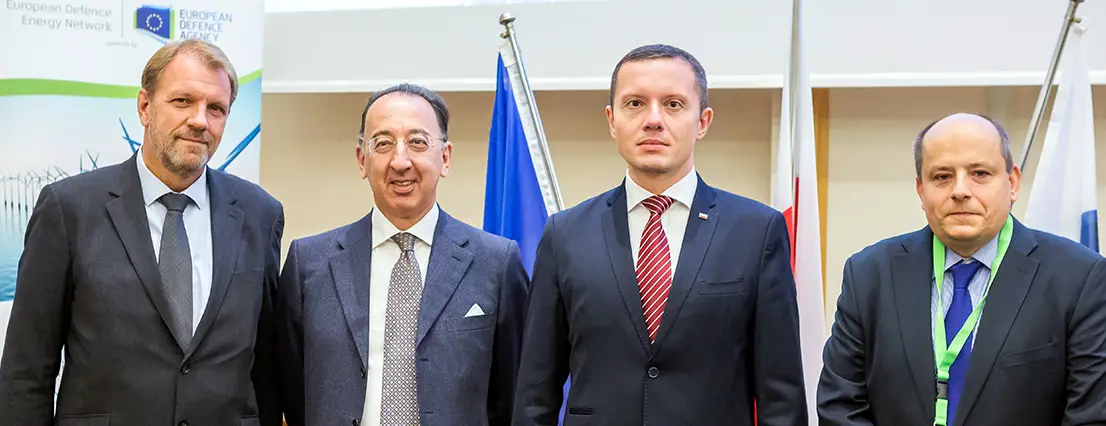Breaking news
European Defense Agency: further progress in sustainable energy for defense sector.
Over 140 experts from 27 European countries and more than 30 different institutions and organisations participate on 16 and 17 October in the Conference on the second Phase of the Consultation Forum for Sustainable Energy in the Defence and Security Sector (CF SEDSS II). The Forum brings together experts from the defense and energy sectors to share information and best practices on improving energy management, energy efficiency, the use of renewable energy as well as increasing the protection and resilience of defense energy-related critical infrastructures.

The Conference address several topics ranging from energy data in defence, energy metering & data collection, energy performance contracts, RES projects including energy storage to critical energy infrastructure resilience and energy-related legislation. (Picture source: EDA)
Managed by EDA, the Consultation Forum is a European Commission initiative (DG ENER) receiving funding under the European Union’s Horizon 2020 R&I programme. The conference of 16 and 17 October was officially opened by Mr Tomasz Zdzikot, Polish Deputy Minister of Defence. Jorge Domecq, the EDA Chief Executive highlighted in his speech the “large number of participants which send the strong message that sustainable energy matters for defence, and a greener defence energy matters for the European Union”.
Mr Hans Van Steen, Acting Director for Renewables, Research and Innovation, Energy Efficiency, DG ENER, European Commission, underlined the importance of having seen “a network develop, information being exchanged, best practices being shared, and capacity, trust and self-confidence grow”.
The Consultation Forum provides a unique platform that can assist the Ministries of Defense of the EU Member States to generate ideas for defense energy policies, strategies, action plans and defense energy-related project ideas. This process will enable them to move towards a more sustainable energy model bringing down energy bills that can be allocated to other military priorities. In this respect, the second phase is more project-oriented, and as the Chief Executive underlined, it “presents a financial and strategic opportunity to improve energy efficiency and to diversify the energy supply and enhance resilience to security challenges”.
Mr Hans Van Steen drew the participants’ attention to the fact that “At a time of tight defense budgets, the Defense and Security sector cannot afford to ignore the opportunities that a state-of-the-art approach to energy efficiency and renewable energy sources offer in terms of economic advantages, security of supply and environmental impact”. He then added that, in this context, “It is very important that the Defence community has a clear understanding of how the new EU legislation on energy could affect its work. The Energy Union Framework Strategy is not only about energy and climate: it is part of a wider policy aimed at accelerating the fundamental modernisation of Europe's entire economy, making it low-carbon and energy and resource efficient, by transforming the whole energy system in a socially fair manner.“
The Warsaw Conference focusses on a range of financing and funding options, coming either from the national public sector or the European Union instruments. To support this process, the Chief Executive has launched today the European Funding Gateway for Energy in Defence, a dedicated web-page on the EDA website. Through this instrument, he encourages the participants to explore what is “an overview of the financing and funding opportunities that the defence sector, and the Ministries of Defence and Armed Forces, industry, research and technology organisations or academia, can access at the European level for energy-related projects”.
The Conference lasts two days and addresses several topics ranging from energy data in defence, energy metering & data collection, energy performance contracts, RES projects including energy storage to critical energy infrastructure resilience and energy-related legislation.
The Consultation Forum for Sustainable Energy in the Defence and Security Sector (CF SEDSS) is a European Commission initiative managed by the EDA. It aims at bringing together experts from the defence and energy sectors to share information and best practices on improving energy management, energy efficiency, the use of renewable energy as well increasing the protection and resilience of defence energy-related critical infrastructures. On 20 October 2017, the second phase of the Consultation Forum (CF SEDSS II) was launched. This project has received funding from the European Union’s Horizon 2020 research and innovation programme, and the agreement is between the EASME executive agency and the EDA. The contract was signed on 16 October 2017 for 22 months, expiring on August 2019.
Based on the foundations laid during the first phase of the Consultation Forum (2015-2017), the second phase has been further expanded to cover the following interrelated subjects though three main working groups (including sub-working groups): WG 1: Energy Management including Energy Efficiency (Sub-WG1: Energy Management and Sub-WG2: Energy Efficiency; WG 2: Renewable Energy Sources and Technologies; WG 3: Protection of Critical Energy Infrastructure and one cross-cutting theme: Finance.


























